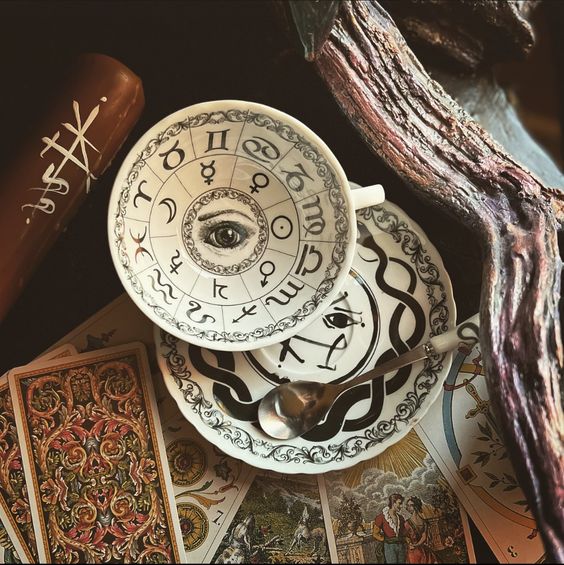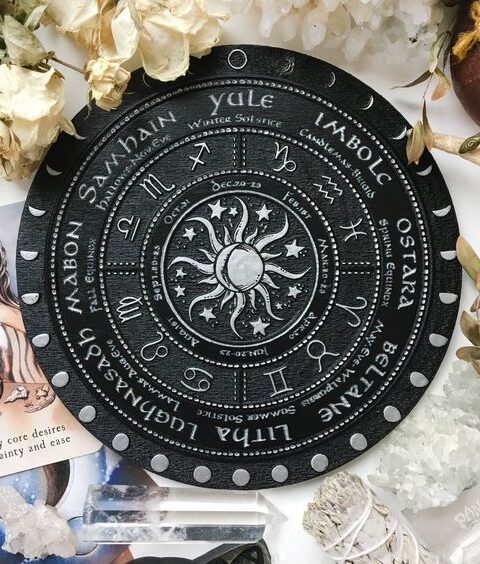
How Does Astrology Work?
 Astrology, often considered a blend of science and spirituality, has fascinated humans for centuries, but its exact mechanisms and influence remain enigmatic. Despite its ambiguity and skepticism from the scientific community, astrology continues to attract followers who believe in its ability to offer insights into personalities, relationships, and even life events. The complexity of astrology arises from the multifaceted layers of its interpretation, ranging from celestial bodies’ positions to the archetypal symbolism they represent. The fundamental premise of astrology lies in the notion that the positions and movements of celestial bodies, including planets, relative to Earth can have an impact on human life and behavior. Astrology believes that these positions at the time of a person’s birth can influence their personality traits, strengths, challenges, and even life’s trajectory. The zodiac signs, which are based on the positions of the Sun, Moon, and planets in relation to constellations, form the basis of astrological interpretation.
Astrology, often considered a blend of science and spirituality, has fascinated humans for centuries, but its exact mechanisms and influence remain enigmatic. Despite its ambiguity and skepticism from the scientific community, astrology continues to attract followers who believe in its ability to offer insights into personalities, relationships, and even life events. The complexity of astrology arises from the multifaceted layers of its interpretation, ranging from celestial bodies’ positions to the archetypal symbolism they represent. The fundamental premise of astrology lies in the notion that the positions and movements of celestial bodies, including planets, relative to Earth can have an impact on human life and behavior. Astrology believes that these positions at the time of a person’s birth can influence their personality traits, strengths, challenges, and even life’s trajectory. The zodiac signs, which are based on the positions of the Sun, Moon, and planets in relation to constellations, form the basis of astrological interpretation.
However, when it comes to understanding how planets exert their influence, astrology enters the realm of mystery. The connection between planetary positions and human experiences is largely metaphorical and symbolic, rather than directly causal as in scientific cause-and-effect relationships. Astrologers interpret these celestial positions and their relationships to draw insights into various aspects of a person’s life.
The tension between astrology and science persists due to the contrasting methodologies they employ. Science relies on empirical evidence, rigorous testing, and falsifiability, whereas astrology’s foundations are more subjective and interpretive. This discrepancy has led many scientists to label astrology as a pseudoscience, dismissing its claims of cosmic influence. Astrology’s devotees, some of whom may be scientists themselves, often face criticism for their beliefs. The societal stigma and skepticism surrounding astrology can drive many practitioners to keep their interests private, fearing backlash from their peers or colleagues. However, historical figures like Sir Isaac Newton have famously defended astrology, showcasing that even renowned scientists can find value in its concepts.
However, in the case of Newton, the astrological literature presents a different view and even claims that Newton was in secret an ardent student of astrology. As evidence the following anecdote is often quoted: when the astronomer Edmond Halley (1656-1742), of comet fame, once spoke depreciatively on the subject of astrology, Newton is said to have berated him with the remark: “Sir Halley, I have studied the matter, you have not!” Isaac Newton and Astrology
Although there are lots of scientists/astronomers studying things that do not exist, and probably more in the realm of physics. In the realm of physics, particularly in fields like quantum mechanics and cosmology, researchers delve into the fabric of reality itself. Concepts such as dark matter, dark energy, multiple dimensions, and the nature of time push the boundaries of our understanding. These theoretical constructs may not have direct empirical evidence yet, but they emerge from mathematical models and observations that hint at their potential existence.
Extra-sensory perception -telepathy, pre-cognition, astrology, clairvoyance, hypnosis – has for generations been dismissed as illusion, coincidence, spookery, fakery or near insanity. But now physics cheerfully breaks all the ‘laws of nature’ with such concepts as black holes and time flowing backwards.
Alice Bailey’s assertion that astrology is based on the “imaginary path of the Sun through the heavens” points to the fact that astrological interpretations are grounded in symbolic connections rather than direct causal relationships. The zodiac’s alignment with the “Great Illusion” suggests that astrology draws upon the inherent mysteries of the cosmos, utilizing the symbolism of celestial bodies to offer insights into human experiences. Despite its reliance on symbolism and the concept of illusion, Bailey also emphasizes that astrology serves as a powerful medium for presenting occult truths. In the realm of esoteric knowledge, occult truths refer to insights and wisdom that go beyond the surface understanding of reality. This suggests that astrology, while not a conventional scientific discipline, taps into deeper layers of meaning and understanding that resonate with individuals seeking a more profound connection to the universe. Bailey’s observation that humans are naturally drawn to cause-and-effect relationships and patterns resonates with the human tendency to seek meaning in the world around us. Astrology’s appeal lies in its attempt to provide a framework that connects the movements of celestial bodies with events and characteristics in human lives. This pattern-seeking inclination reflects our innate desire to find order and purpose in what might otherwise appear chaotic or random.
Below are some more theories on why astrology works by astrologers.
In itself astrology is not magical, religious, or psychic even though people who study astrology may exhibit those qualities. So your study of astrology won’t take you into magical rituals, devil worshipping or mystical understandings about the universe…One of the theories (why astrology works) suggests that the gravitational pull and magnetic forces that affect the Earth also have an effect on us. Scientists have discovered that the Moon affects the tides and that sunspots and eclipses correspond with geological tension. Expanding on these theories, it makes sense to hypothesise that animals and humans might also feel the influence of the “heavenly” bodies: the Sun, Moon, and planets. From his point of view, depending on where and when you were living, you’d experience different “cosmic” influences which would trigger biological and emotional responses in you. The planets might actually compel you to act and react. Choice Centered Astrology: The Basics
Finally, astrology also operates based on the Law of Beginnings, which states that the beginning point of a thing contains the potential that will be fulfilled during the life cycle and beyond. Astrology: Understanding the Birth Chart
My particular view is that the answer may be found one day when we have the technology to study magnetic fields and solar activity in much greater depth. The specifics of magnetism are far more complex than those of gravity. The Earth’s magnetic field is very weak when compared with gravity, but it could be supremely important. In astrology, each individual person represents his place of birth on Earth in geometric relations to our solar system at the particular time of birth. It may be dependent on conception, but we have no know method of measuring that – yet! Predictive Astrology: A Practical Guide
Though astrology is often seen as implausible because the cause behind it cannot be explained, other unseen forces know only by their results (e.g., electricity and magnetism) have long been accepted by science. If one accepts the commonly held belief that the Moon’s cycle affects the tides on Earth, it is not a huge leap to suggest that other planetary influences – undiscovered or unmeasured – are operating. Regardless, astrology’s results speak loudly to those who appreciate symbols and archetypes. Conscious Footsteps: Finding Spirit in Everyday Matters
Astrology’s roots lie in an ancient world view which perceived the universe as a single living organism, animated by divine order and intelligence. This world-view is currently finding renewed credibility through the researches of quantum physics and depth psychology, which have found new terms to define ancient truths. The precision and geometry of celestial movements seemed, to the minds of antiquity, to reflect the hidden nature and intentions of deity…The study of astrology is the study of the qualities of time. Put another way, it describes archetypal principles and the ways in which these are expressed in everyday life. Mythic Astrology







 Uranus Transits: 1st House: Winds of Change:
Uranus Transits: 1st House: Winds of Change:
 Uranus Transits 8th the House: Rebirth from Chaos
Uranus Transits 8th the House: Rebirth from Chaos
 Venus-Pluto Synastry: A Love So Powerful That It Might Just Kill Them
Venus-Pluto Synastry: A Love So Powerful That It Might Just Kill Them
 Sun Conjunct Pluto Synastry: Enlightening or Annihilating
Sun Conjunct Pluto Synastry: Enlightening or Annihilating
 Mars Conjunct Pluto Synastry
Mars Conjunct Pluto Synastry
 Venus Conjunct Pluto Natal Aspect
Venus Conjunct Pluto Natal Aspect
 Uranus in the 2nd House: The Price of Freedom
Uranus in the 2nd House: The Price of Freedom
 Transiting Uranus Trines Mercury: Through New Eyes
Transiting Uranus Trines Mercury: Through New Eyes
 Scorpio’s Cold Withdrawal
Scorpio’s Cold Withdrawal
 Uranus Transits the 4th House: The Chaotic Path to Personal Inner Growth
Uranus Transits the 4th House: The Chaotic Path to Personal Inner Growth
 Flash Forward: How Uranus Reveals Your Future Before You’re Ready
Flash Forward: How Uranus Reveals Your Future Before You’re Ready
 Uranus Transits Mars: My Eco-Lifestyle Changes
Uranus Transits Mars: My Eco-Lifestyle Changes
 Mercury in the 9th House: The Mystic Messenger
Mercury in the 9th House: The Mystic Messenger
 Sun Square Pluto Synastry: You’ve Got That Power Over Me
Sun Square Pluto Synastry: You’ve Got That Power Over Me
 The Neptunian: Highs, Heartache, and the Water Slide of Disclosure
The Neptunian: Highs, Heartache, and the Water Slide of Disclosure
 Uranus Transits Mars: My Carbon Footprint Intervention
Uranus Transits Mars: My Carbon Footprint Intervention
 Mars in the 12th House: Are You a Passive Victim of Weird Energies?
Mars in the 12th House: Are You a Passive Victim of Weird Energies?
 Saturn Square Pluto Natal Aspect
Saturn Square Pluto Natal Aspect
 Pluto in Aquarius: Collective Welfare
Pluto in Aquarius: Collective Welfare
 Venus Square Jupiter Synastry
Venus Square Jupiter Synastry